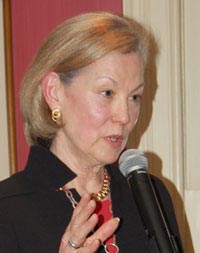
Washington, DC—On February 27, 2013, Karen Elliott House, former publisher of The Wall Street Journal, joined WFPG in DC to speak on her new book, On Saudi Arabia: Its People, Past, Religion, Fault Lines—And Future. House described the factors affecting stability in Saudi Arabia, as well as areas for opportunity and potential challenges that the kingdom faces domestically and internationally. House addressed the situation of Saudi youth, the royal family, oil wealth, and the impact of the Arab awakening on the autocratic monarchy. Additionally, House covered Saudi-American relations, and their impact on the Gulf states and the Middle East. The program was hosted by Board Member Diana Villiers Negroponte in DC.
According to House, the stability of Saudi Arabia rests on three pillars: oil wealth, the religious establishment, and the Al-Saud family—all of which are facing challenges. Oil wealth is being threatened by rising domestic consumption and could potentially suffer if America becomes more energy self-sufficient. The religious establishment is being jeopardized by the growing divide between the way Islam is preached and practiced. Lastly, the Al-Saud family will face a succession issue following the death the last prince of the ruling generation. While she does not expect the pillars to fail, House believes that there are irrevocable cracks that need to be addressed.
In her remarks, House also discussed a variety of social issues including high unemployment, the ballooning youth population, and the impact of social media, as well as the government’s attempt to control internet access, specifically with regards to YouTube and Twitter. House pointed to the stunning statistic that in a country of 27 million people, Saudis watch around 90 million YouTube videos a day. Their population is also incredibly young—60% of its citizens are under 20 years old. Turning to the Arab Spring, House addressed the different strategies enacted by the Al-Saud family to prevent having to squelch a revolution of their own. House also responded to questions about Wahhabism and Islamic jihadism, and how the west should respond to Islamic fundamentalism by supporting the moderates instead of targeting the extremists.
House went into great detail on the role of women, and emphasized her belief that she sees women as the salvation of Saudi Arabia and as potential agents of change. She pointed to their participation in the Shura Council as a sign of their rising political status, even if it is largely symbolic. In addition to being more politically active, women are now a growing force in the private sector, slowly being offered more entrepreneurial opportunities, and participating in the work force by working at businesses open to women, like lingerie stores. Although women are making great strides, House believes Saudi Arabia’s so-called feminist movement will be unique in that, “they’re not going to be bra-burning. They’re using the Quran to defend themselves against the religious establishment, the same way the religious establishment uses the Quran on women.” In contrast to this, House mentions that there is still a great deal of hesitation from women with more conservative values that seek to maintain the status quo.
Her remarks and personal anecdotes conveyed her admiration of Saudi people, namely their generosity and kindness, which she was able to experience through the past thirty years of travel and study. House also shared that she felt continually drawn back to Saudi Arabia, both personally and professionally. She partially attributes this fascination to her own upbringing in a small, conservative, religious town in the panhandle of Texas, which she felt helped her to relate to Saudi Arabia more than the average American.
In closing, House left the audience with the same metaphor that closes her book. She describes Saudi Arabia as a 747 jet that has a cockpit filled with competing, geriatric pilots, a hull of frustrated youth and the unemployed, and lastly a group of jihadists determined to hijack the course of Saudi Arabia’s future.
|
|